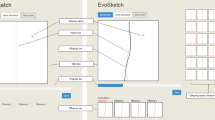Abstract
The use of computer simulations as educational tools may afford the means to develop understanding of evolution as a natural, emergent, and decentralized process. However, special consideration of developmental constraints on learning may be necessary when using these technologies. Specifically, the essentialist (biological forms possess an immutable essence), teleological (assignment of purpose to living things and/or parts of living things that may not be purposeful), and intentionality (assumption that events are caused by an intelligent agent) biases may be reinforced through the use of computer simulations, rather than addressed with instruction. We examine the video game Spore for its depiction of evolutionary content and its potential to reinforce these cognitive biases. In particular, we discuss three pedagogical strategies to mitigate weaknesses of Spore and other computer simulations: directly targeting misconceptions through refutational approaches, targeting specific principles of scientific inquiry, and directly addressing issues related to models as cognitive tools.
Similar content being viewed by others
References
Archambault LM, Crippen KJ (2009) Examining TPACK Among K-12 online distance educators in the United States. Contemp Issues Technol Teach Educ: Gen 9(1):71–88
Bohannon J (2008a) Flunking spore. Science 322(5901):531
Bohannon J (2008b) “Spore” documentary spawns protest by scientists who starred in it. Science 322(5901):517
Brem SK, Ranney M, Schindel J (2003) Perceived consequences of evolution: college students perceive negative personal and social impact of evolutionary theory. Sci Educ 87(2):181–206
Broughton S, Sinatra GM, Reynolds RE (in press) The nature of the refutation text effect: implications of attention allocation. J Educ Res
Buckley B, Gobert J, Kindfield A, Horwitz P, Tinker R, Gerlits B et al (2004) Model-based teaching and learning with BioLogica™: what do they learn? How do they learn? How do we know? J Sci Educ Technol 13(1):23–41
Chi M (2005) Commonsense conceptions of emergent processes: why some misconceptions are robust. J Learn Sci 14(2):161–199
Colbert JA, Boyd KE, Clark KA, Guan S, Harris JB, Kelley MA et al (2008) Handbook of technological pedagogical content knowledge (TPCK) for educators. Routledge, New York, NY
Electronic Arts (2008) What is SPORE? http://www.spore.com/what
Evans EM (2008) Conceptual change and evolutionary biology: a developmental analysis. In: Vosniadou S (ed) International handbook of research on conceptual change. Routledge, London, pp 263–294
Frijda N (1967) Problems of computer simulation. Behav Sci 12(1):59–67
Gee JP (2003) What video games have to teach us about learning and literacy. Palgrave/St. Martin’s, New York
Jonassen DH (2006) Modeling with technology: mindtools for conceptual change, 3rd edn. Pearson Prentice Hall, Upper Saddle River, NJ
Kelemen D (1999) Why are rocks pointy? Children’s preference for teleological explanations of the natural world. Dev Psychol 35(6):1440–1452
Lawson AE, Worsnop WA (1992) Learning about evolution and rejecting a belief in special creation: effects of reflective reasoning skill, prior knowledge, prior belief, and religious commitment. J Res Sci Teach 29:143–166
Mason L, Gava M, Boldrin A (2008) On warm conceptual change: the interplay of text, epistemological beliefs, and topic interest. J Educ Psychol 100(2):291–309
Mishiso K (2008) Spore evolution. http://www.youtube.com/watch?v=Nv1GggD6x4E&eurl=http%3A%2F%2Fantispore%2Ecom%2F&feature=player_embedded. Retrieved March 28 2009
National Academy of Sciences (1998) Teaching evolution and the nature of science. National Academy Press, Washington, DC
Papert S (2002) The turtle’s long slow trip: macro-educological perspectives on microworlds. J Educ Comput Res 27(1 & 2):7–27
Schrader PG and McCreery M (2007) The acquisition of skill and expertise in massively multiplayer online games. Educational technology research & development. http://www.springerlink.com/content/n2496u376825u512/. Retrieved October 10 2007
Schrader PG, Lawless KA, Deniz H (in press) Videogames in education: Opportunities for learning beyond the rhetoric and hype. In: Zemliansky P and Wilcox D (eds) Design and implementation of educational games: theoretical and practical perspectives. Hershey, PA: Information Science Reference
Shtulman A (2006) Qualitative differences between naïve and scientific theories of evolution. Cogn Psychol 52(2):170–194
Sinatra G, Brem S, Evans E (2008) Changing minds? Implications of conceptual change for teaching and learning about biological evolution. Evol Educ Outreach 1:189–195
Squire KD (2006) From content to context: videogames as designed experience. Educ Res 35(8):19–29
Steinkuehler CA (2005) The new third place: massively multiplayer online gaming in American youth culture. Tidskrift J Res Teach Educ 3:17–32
Stewart J, Hafner R, Johnson S, Finkel E (1992) Science as model building: computers and high-school genetics. Educ Psychol 27(3):317–336
Van Eck R (2006) Digital game-based learning: It’s not just the digital natives who are restless. EDUCAUSE Rev 41(2):16–30
Wilensky U (1997) NetLogo peppered moth’s model. http://ccl.northwestern.edu/netlogo/models/PepperedMoths. Center for connected learning and computer-based modeling, Northwestern University, Evanston, IL
Wilensky U, Reisman K (2006) Thinking like a wolf, a sheep, or a firefly: learning biology through constructing and testing computational theories; an embodied modeling approach. Cogn Instr 24(2):171–209
Wright W (2008) The science behind spore. http://www.youtube.com/watch?v=dH5ALcdxNag . Retrieved March 28 2009
Young MF, Schrader PG, Zheng DP (2006) MMOGs as learning environments: an ecological journey into quest Atlantis and the Sims online. Innovate, 2(4). http://www.innovateonline.info/index.php?view=article&id=66. Accessed March 20 2006
Zacharia Z (2005) The impact of interactive computer simulations on the nature and quality of postgraduate science teachers’ explanations in physics. Int J Sci Educ 27(14):1741–1767
Author information
Authors and Affiliations
Corresponding author
Rights and permissions
About this article
Cite this article
Bean, T.E., Sinatra, G.M. & Schrader, P.G. Spore: Spawning Evolutionary Misconceptions?. J Sci Educ Technol 19, 409–414 (2010). https://doi.org/10.1007/s10956-010-9211-1
Published:
Issue Date:
DOI: https://doi.org/10.1007/s10956-010-9211-1




